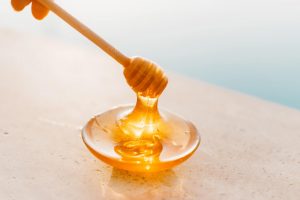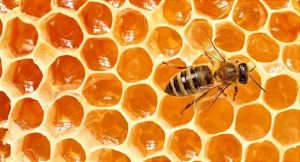8 benefits of honey to profit from
Humans have been using honey for thousands of years. But is it really healthy? Can it spoil? How many calories does it contain? And what is its best type?
In fact, sugar and honey contain the same number of calories, but it contains more nutrients than sugar. Are you wondering why it has such a beneficial effect on your health?
Indeed, this nature’s gift is known for its therapeutic properties, its ability to lower blood sugar levels and promote digestion, etc.

What is honey?
It’s a sweet viscous fluid produced by bees or the droppings of plant-sucking insects.
Honey production process:

Being a bee’s product, it goes through different stages before it is produced by them depending on its final texture:
- The bees collect the nectar from the flowers.
- They store it in the crop when they are in the field.
- In the bag, they transform it by combining it with specific substances specific to bees.
- They then deposit it in the already transformed hive, in open, hexagonal cells.
- In the cells, the process of maturation takes place, where there is loss of water and hydrolysis of sucrose.
- Once the conditioning is complete, the bees seal the cells with a layer of wax.
Classification of honey types:

Monofloral Honey:
This type is known for its 45% pollen which usually comes from the same plant species.
Bifloral Honey:
This one is composed of pollen from two species of plants, reaching a minimum value of 50% as a whole.
Multifloral Honey:
Is made up of three or more plant species, none of which reaches a percentage greater than or equal to 45%.
What is the difference between consuming honey and consuming sugar?
Honey is not a common sweetener like table sugar which is 100% sucrose might be. It is a 100% NATURAL food made up of simple, predigested sugars such as glucose, fructose, maltose. It provides not only calories but also amino acids, enzymes, vitamins, natural antibiotics and a large amount of minerals.
Benefits of Honey
We all agree that the composition of the bees product makes it both tasty and healthy: it’s like tasting a caramel loaded with antioxidants and nutrients, without having to worry about taking the same damage as when we eat traditional refined sugar. This is because it contains phenolic and flavonoid compounds. These are needed to decrease free radicals which damage cells.
It helps facilitate digestion due to the enzymes it contains. Also, it decreases the production of gas and the acidity of the stomach, and improves intestinal transit through its high content of oligosaccharides, and regulates the water level in the body. In addition, it regulates the intestinal flora.
In addition, this fluid prevents infections, strengthens the immune system, and relieves respiratory and throat symptoms. This is attributed to its antimicrobial, antiseptic, antibiotic and anti-inflammatory properties.
The benefits of the sweet liquid are by no means new. Since ancient times, cultures such as the Egyptian have incorporated it into the most diverse health activities. Since then, its use as an antibiotic or as a medicinal food was so popular in several countries that it has even survived to this day. Not to mention, it’s incredibly delicious.
Honey is rich in healthy nutrients
Being a gift from the bees that is far from a hollow enough flavor like so many others we know. Bees store the best of flowers: the most important sugars, amino acids and minerals in plants are concentrated in the nectar. Once regurgitated by bees, the nectar goes through a process that improves it. Nutritionally, the result of this process is amazing. One tablespoon of this nature’s cure may contain:
- 64 calories.
- 17 grams of sugar, including fructose, glucose, maltose and sucrose.
- It is virtually free from fiber, fat or protein.
- Vitamins and minerals in small amounts.
- Antioxidants
Its antioxidants lower blood pressure
This is another effect of the antioxidants in honey on the blood. Different studies have shown that it lowers blood pressure. However, other sources of antioxidants should not be overlooked as well as regular exercise.
Helps lower cholesterol
Cholesterol is a great risk to the heart system for which the sweet liquid could be a useful defense. Several studies have shown significant results in this regard, ensuring that it does not only lowers cholesterol levels, but also regulates it.
Lowers triglycerides
Triglycerides are our internal enemy: they come from the sugar and fat we eat, and they can cause problems ranging from heart risks to the possible onset of type 2 diabetes.
However, the sugar in it is an exception to the triglyceride rule. Some studies have shown that consuming it instead of sugar can lower triglyceride levels. Optimistic studies attribute this difference to an 11-19% lower risk of triglycerides in those who consume honey as a substitute.
Can reduce cough in children
Cough is a common respiratory problem in children. In the long run, it can affect your sleep hours and your overall health. Many medical cough remedies claim to contain honey to promote itself for a reason – it is effective in curing this condition.
Some studies have found that this nature’s wonder produced by bees is very effective in reducing cough symptoms, recovering sleep patterns better than any commercial drug. However, its consumption in children under 1 year of age can cause botulism, which is not recommended in this case.
Our Honey Products:
Our stores offer a wide range of monofloral and multi-floral :
Monofloral honeys
For the types of monofloral honeys that you can find in our stores, we quote:
Eucalyptus honey:
This type is great for flu and cold. As with most t, it is great for colds and the flu. In addition, it works against respiratory diseases, and is an excellent antiseptic and anti-inflammatory against urinary system problems such as kidney stones, nephritis and cystitis.
Spurge honey:
Spurge has important bactericidal properties attributed to the presence of glucose. It can be used to treat acne and exfoliate the skin. It also contains proteins, enzymes and amino acids. These come from the activity of the bees themselves, and sometimes from the nectar of the plant. Proteins play a fundamental role in the growth and synthesis of different tissues.
Orange blossom honey:
Acts as a natural sedative or tranquilizer, especially when mixed with herbal teas or hot milk. Orange blossom honey also has antimicrobial and antiseptic properties that promote wound healing.
Thyme honey:
It improves digestion, helps prevent and relieve stomach aches and, in addition, promotes intestinal transit after meals. This type treats throat infections, reduces blood pressure and blood pressure. Likewise, it also prevents premature aging of the skin and protects our cells from damaging effects.
Thistle honey:
Traditional medicine recommends using this type to treat neurosis and insomnia, restoration of brain cells after stroke, diseases of the liver and bile ducts, normalization of the digestive tract, heart disease, elimination of toxins, substances harmful, hypertension, normalization of metabolic processes, vascular disease, and to heal wounds and burns.
Jujube honey:
This type contains analgesic, anti-inflammatory and antimicrobial active ingredients. It is excellent against respiratory infections, coughs and sore throats. In addition, it helps lower fever, contains vitamin A and C which strengthen the immune system, applies to certain infectious diseases of the eyes, burns, acne, eczema, and psoriasis.
Ammi Visnaga’s honey:
This type’s origin is Moroccan, it is used to treat allergic asthma problems, to fight against eye diseases, hypertension, cardiovascular diseases, infertility, nasal infections, oral infections, and ovarian cysts.
Carob honey:
The consumption of this type improves intestinal transit in addition to improving our defenses, helping us to fight high cholesterol by reducing blood sugar.
Lavender honey:
It has the highest levels of tyrosine, an amino acid that the body uses to produce neurotransmitters. This element has been used in medicines to prevent and treat certain illnesses such as anxiety and depression. For these reasons, it is used to alleviate the effects of emotional and physical stress, working effectively against states of anxiety and insomnia. A relaxing infusion with a teaspoon of honey in the evening allows you to fall asleep better and rest better. On the other hand, the lavender plant is beneficial to fight against fever and nausea, this type can thus help in case of stomach pain, as well as in feverish states and migraines.
Propolis:
Propolis softens the throat and reduces hoarseness, which is one of the most common voice problems. It strengthens the immune system thanks to the high concentration of vitamins and minerals and acts as a natural immune shield. Propolis purifies oily skin and regulates secretions, as well as cleanses the pores and prevents the formation of blackheads. In addition, it soothes the irritated scalp and neutralizes irritation.
Multifloral honeys
On the other hand, we also offer you multifloral honeys such as:
Thousand flower honey:
It has multiple benefits for our health. Some of its advantages are natural slimming, because it contains less calories than any industrial sugar, it is a natural antibiotic, allows the disinfection of small wounds and scratches, serves to prevent digestion problems, respiratory problems and throat irritations, it fights stomach acidity and its enzymes help alleviate digestive processes.
Mountain honey:
It has great antimicrobial properties: it strengthens the immune system, relieves coughs, colds, flu and sore throats, helps with gynecological inflammation caused by viruses and bacteria, and can help with healing of foot wounds.
Honey season lasts all year round, so hurry up and make the most of it and don’t forget to tell us which honey type you prefer the most and why!
To Read: Argan oil: 10 health benefits.
